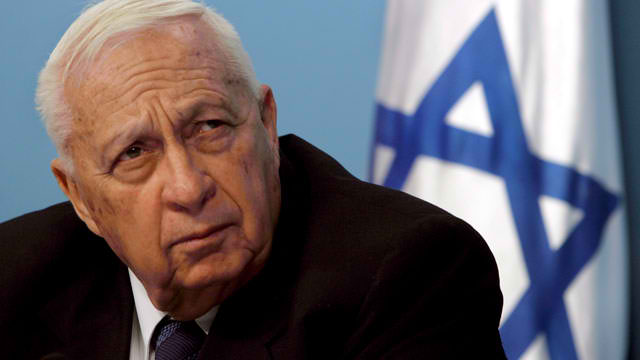SUMMARY
This is AI generated summarization, which may have errors. For context, always refer to the full article.

TEL AVIV, Israel (UPDATED) – Former Israeli premier Ariel Sharon died in hospital near Tel Aviv Saturday, January 11, after eight years in a coma, prompting a flood of tributes in Israel but contempt from Palestinians. He was 85.
“He’s gone,” his son Gilad told reporters at the Sheba Medical Centre in Tel HaShomer. “He went when he decided to go.”
Sharon had been comatose since January 4, 2006, after suffering a massive stroke. His condition took a sudden turn for the worse on New Year’s Day when he suffered serious kidney problems after surgery.
Professor Shlomo Noy of Sheba hospital said Sharon’s heart “had weakened” and that he died at around 1200 GMT.
Sharon’s body would lie in state at Jerusalem’s Knesset, or parliament, on Sunday, January 12, to enable citizens to pay their final respects between 1000 GMT and 1600 GMT, a statement from the prime minister’s office said.
Sharon will be buried on Monday afternoon, January 13, at his ranch in the Negev desert in southern Israel in a military ceremony, after a memorial service in parliament starting at 0730 GMT, the statement read.
Controversial
The burly white-haired Sharon was one of Israel’s most skilled but controversial political and military leaders. Hailed by many Israelis as a statesman, his ruthless methods also earned him the moniker “The Bulldozer”.
As news of his death emerged, tributes poured in from Israel and abroad, but the Palestinians were quick to denounce him as a “criminal” who had escaped international justice.
Prime Minister Benjamin Netanyahu expressed “deep sorrow” and said Israel would “forever” cherish Sharon’s memory.
“His memory will forever be held in the heart of the nation,” a statement from his office said.
President Shimon Peres said he would be “greatly missed.”
“My dear friend, Arik (Ariel) Sharon, lost his final battle today,” he said.
World leaders also sent condolences, with US President Barack Obama describing him as a leader who “dedicated his life to the State of Israel.”
Vice President Joe Biden will lead a US delegation to the memorial service.
US Secretary of State John Kerry, who is leading efforts to broker an Israeli-Palestinian peace deal, remembered him warmly as a “big bear of a man” who in his final years “surprised many in his pursuit of peace.”
A legacy of ‘pragmatism’
UN Secretary General Ban Ki-moon hailed Sharon as a “hero to his people” who will be “remembered for his political courage and determination to carry through with the painful and historic decision to withdraw Israeli settlers and troops from the Gaza Strip.”
He urged Israel to build on his “legacy of pragmatism” to work to achieve a viable Palestinian state.
Former US president Bill Clinton and his wife Hillary, an ex-Secretary of State, also paid a personal tribute, saying: “It was an honour to work with him, argue with him, and watch him always trying to find the right path for his beloved country.”
Sharon fought in all of Israel’s major wars before embarking on a turbulent political career in 1973 that ended dramatically when he suffered a stroke in 2006.
Long considered a pariah for his personal but “indirect” responsibility for the 1982 massacre of hundreds of Palestinians by Israel’s Lebanese Phalangist allies in Beirut’s Sabra and Shatila refugee camps, Sharon was elected premier in 2001.
The Palestinians were quick to welcome the news of his death, which prompted an outburst of celebration in the Gaza Strip, from which Sharon controversially ordered the withdrawal of troops and settlers in 2005.
Islamic Jihad members burned pictures of Sharon and handed out sweets.
Gaza’s ruling Hamas movement, which seized power just two years after the Israeli pullout, said Sharon’s death was a “historic moment” marking the “disappearance of a criminal whose hands were covered with Palestinian blood”.
In Ramallah, senior Fatah official Jibril Rajub also welcomed the death of Sharon, whom he accused of being responsible for the still-unexplained 2004 death of Palestinian leader Yasser Arafat.
“Sharon was a criminal, responsible for the assassination of Arafat, and we would have hoped to see him appear before the International Criminal Court as a war criminal,” he said.
Complex legacy
Sarah Leah Whitson, Middle East director at Human Rights Watch, also regretted that Sharon never faced justice, saying “it’s a shame that Sharon has gone to his grave without facing justice for his role in Sabra and Shatila and other abuses”.
One of the last members of the generation that founded the Jewish state in 1948, Sharon leaves a complex legacy that saw him push through a policy of separation from the Palestinians, beginning the sprawling West Bank barrier in 2002, and orchestrating the withdrawal from Gaza.
Born in British-mandate Palestine on February 26, 1928, to immigrants from Belarus, Sharon was just 17 when he joined the Haganah, the militia that fought in the 1948 war of independence and eventually became the Israeli army.
Ever the maverick, Sharon later broke with his life-long right-wing convictions to push through an unprecedentedly bold plan to withdraw Israeli troops and 8,000 settlers from Gaza, earning him the hatred of his former nationalist and settler allies.
“Ariel Sharon was first and foremost a rare military leader who shaped the Israeli army,” said Defence Minister Moshe Yaalon, a bitter opponent of the withdrawal.
“Despite the differences of opinion along the way, I always valued his experience and leadership. The defense establishment.. bows its head today with his departure.” – Rappler.com
Add a comment
How does this make you feel?
There are no comments yet. Add your comment to start the conversation.